Fowers Family History & Genealogy
Fowers Last Name History & Origin
AddHistory
We don't have any information on the history of the Fowers name. Have information to share?
Name Origin
We don't have any information on the origins of the Fowers name. Have information to share?
Spellings & Pronunciations
We don't have any alternate spellings or pronunciation information on the Fowers name. Have information to share?
Nationality & Ethnicity
We don't have any information on the nationality / ethnicity of the Fowers name. Have information to share?
Famous People named Fowers
Are there famous people from the Fowers family? Share their story.
Early Fowerses
These are the earliest records we have of the Fowers family.

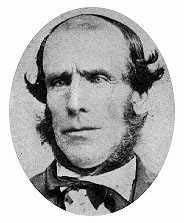

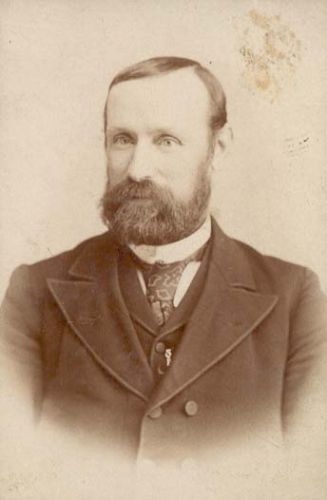

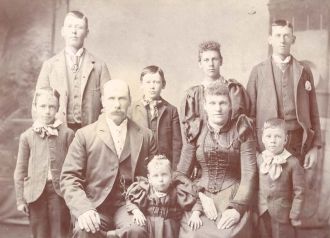

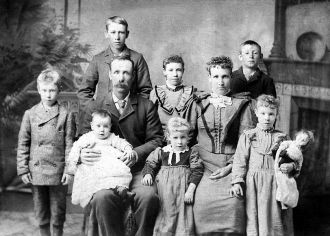



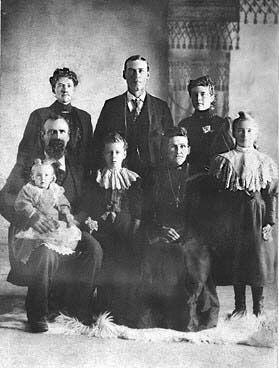





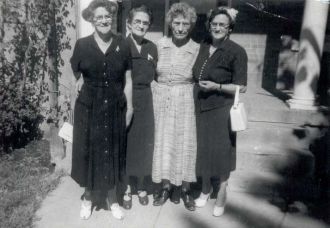



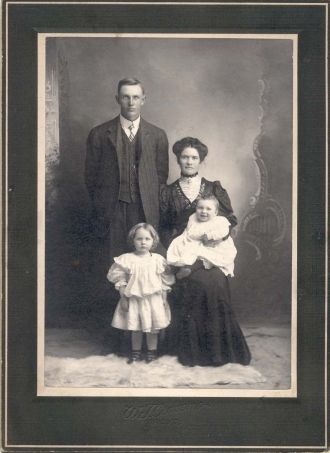
Fowers Family Members
Fowers Family Photos
Discover Fowers family photos shared by the community. These photos contain people and places related to the Fowers last name.
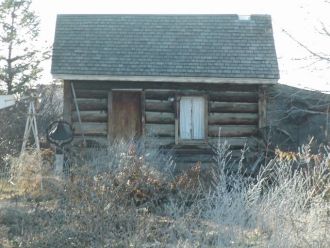
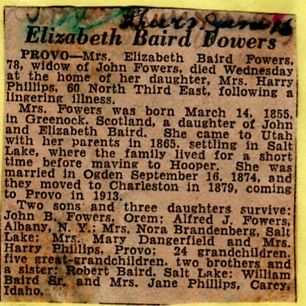
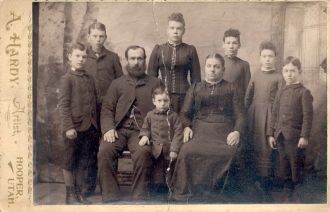
Possible members of family:
Father: William Fowers
Mother: Hannah Dyson
Daughter: Roseanna
Son: William
Daughter: Laura
Daughter: Elizabeth
Son: David
Son: Jesse
Son: Isaac
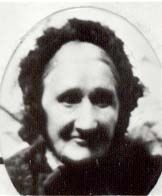
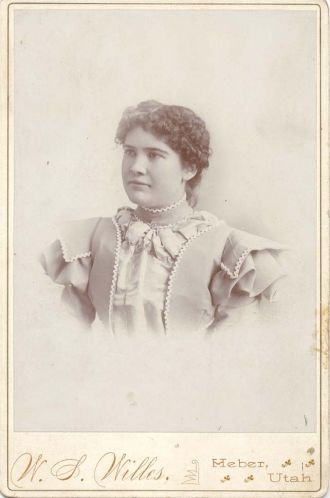
Married John William Daybell.
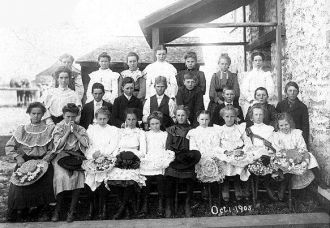
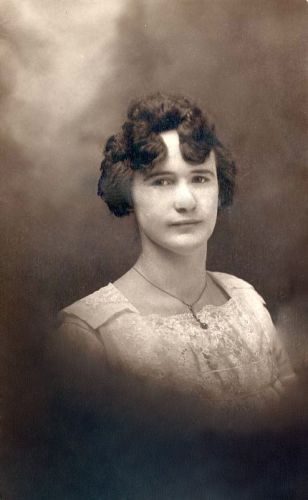


Joseph was the son of Jesse Fowers Sr. and Sarah Johnson.
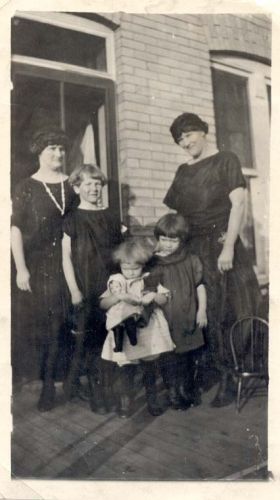
Probably Jessie Fowers Daybell with daughter Grace Daybell. Could be Norma Dangerfield or Nora Fowers, Elizabeth "Lizzy" Fowers Phillips, sister of Jessie, and Joy Phillips, daughter of Lizzy.

Ann Dyson, daughter of John Dyson and Ann Crabtree.
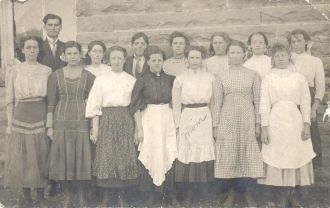
Mary Beatrice Fowers is the one that says "mom" on her apron.
Fowers Family Tree
Discover the most common names, oldest records and life expectancy of people with the last name Fowers.
Updated Fowers Biographies

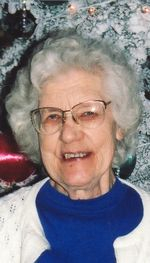









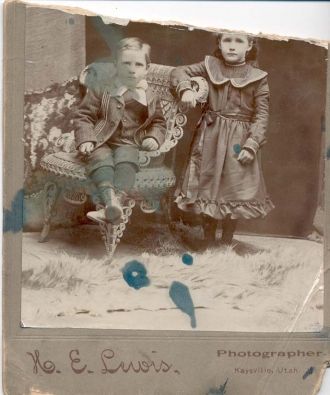














Popular Fowers Biographies






































Fowers Death Records & Life Expectancy
The average age of a Fowers family member is 73.0 years old according to our database of 115 people with the last name Fowers that have a birth and death date listed.
Life Expectancy
Oldest Fowerses
These are the longest-lived members of the Fowers family on AncientFaces.


Other Fowers Records
Share memories about your Fowers family
Leave comments and ask questions related to the Fowers family.
Followers & Sources


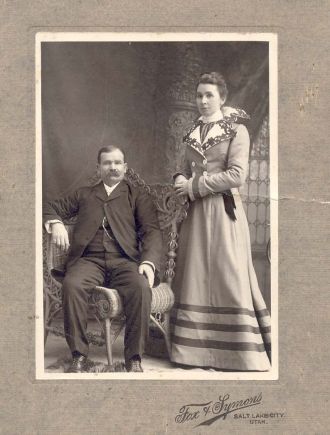

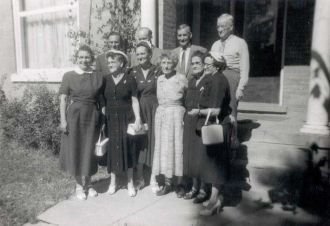

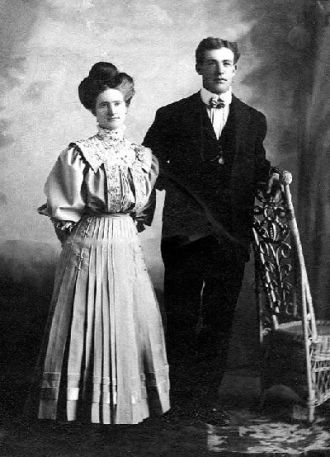

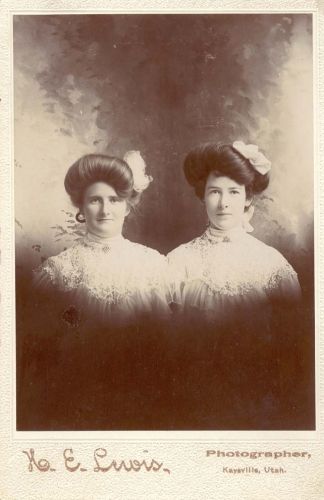
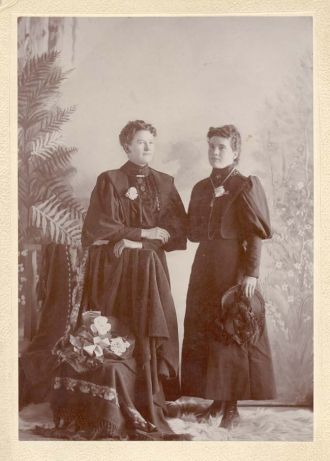
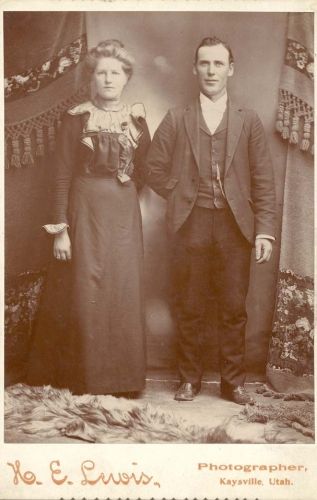

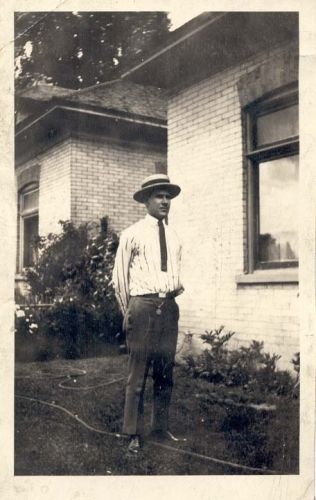
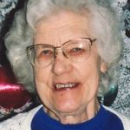
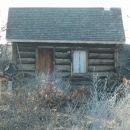
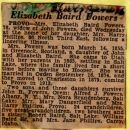
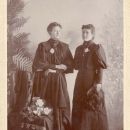
Elizabeth Baird Fowers
Came to Utah in 1866
Written by her daughter, Elizabeth Ann Fowers Phillips
Of Camp No.2
Of Daughters of Utah Pioneers
Provo, Utah
Elizabeth Baird Fowers was born March 14, 1855 in Greenock, Renfrenshire, Scotland the daughter of John Baird and Elizabeth Marshall Baird of Greenock, Scotland. She lived here until she was ten years of age. This was a sea-coast town and well supplied with fish markets. The family liked fish. They used many kinds prepared many ways. There was no thyroid trouble with these people using deep sea fish. Her two baby brothers were born here, John and Joseph. They died in infancy. Her father was a policeman and made a good salary from which they furnished their home with luxurious furnishings and the family was well educated. Their home was built with thick stone walls and wide sills, where her brothers Robert and William stepped dance The Highland Fling and many other step dances of that day.
Her parents heard the Mormon missionaries preaching and investigated. Soon they were saving and working to immigrate to Utah. Her two elder brothers were working also and living in other towns. In June, 1865 she with her parents, a sister Ann and brothers Robert and William and James left Liverpool, England in an old sailing vessel named Bellwood. It had been used as a freighter, but fixed up with bunks and pressed into service as a passenger ship. The crew and passengers were afraid it would sink before they reached New York. There were 700 Mormons aboard and they held meetings and prayed for their safety. It took weeks to make the voyage and sank on the return trip. They were all rationed flour, salt, bacon, and hard-tack each day. The mother was given her allowance, and she prepared it and gave to the cook. When it was cooked she would bring it to her for her family. They were hungry during the entire voyage. An old lady died on ship-board. She was sewn in a sheet with a ball of steel at her feet. A prayer was offered and then threw overboard. The ship leaked and the passengers would hear the captain call his men to man the pumps. When they arrived in New York the passengers offered prayers for the preservation of their lives. They went from Castle Gardens and to Williamsburg. The ferry was $3 each. They rented a home from a Mrs. Johnson a widow. It was just after war and there were many widows, each trying to make a living for their families.
Grandfather Baird and two eldest sons Robert and William worked to earn enough to continue their journey to Utah. They lived here fourteen months, the three younger children attending school where mother sang and danced in school plays. The manager of theatre saw her and tried to persuade her parents to let her train for the stage and perform in the play “Mistletoe Bough”. They refused as they were preparing for their long trek west. It was very cold during the winter and all their provisions were frozen.
In the spring having saved what they thought was sufficient funds they left Williamsburg riding in cattle cars until they reached the Mississippi River. They took a river-boat and soon reached Council Bluffs, Iowa. Here they joined a party of emigrants leaving with Captain Chipman’s company they bought a covered wagon and three yoke of oxen which grandfather Baird drove across the plains with all the family’s belongings and they all had to walk. After a week with this company, Robert and William left to drive a fright train consisting of a number of covered wagons hitched together and pulled by six yoke of oxen at $40.00 per month, of which they only received part payment. The family traveled ahead of the freight train and didn’t hear from their sons until they arrived in Salt Lake City a few days after the family. They met where Hotel Utah now stands. During the trek in the evening when meetings were called mother’s family were asked to sing which they did, “Auld Lang Syne”. “By the Light of the Silvery Moon”, “Annie Laurie” and many hymns which cheered the weary travelers. Heber Giles and Joseph Moulton also Frank Fraughten were among the men driving oxen in this company from Omaha, Nebraska.
Robert and William arrived October 6, 1866 when conference was in session. They were here three weeks. The Baird family again reunited. Jonnie Lee of Heber City moved them to Wasatch County. They lived here for three years and a baby girl Martha Jane was born February 14, 1867. Robert Baird a younger brother of John Baird lived on a farm south of Heber the reason mothers parents moved here. The winters were cold and warm weather seasons short. The family rented a two room house on the outskirts of town. Robert, mother’s eldest brother had bought a watch in New York and which he gave to Mr. McNaughten for rent. This house was on the bank of Dry Creek, later called Lake Creek. Sometime later they moved close to Heber City and bought a home from Bill Cole paying for it with a revolver, dress coat made Prince Albert style and some wheat they had raised at Center Creek on a farm rented from a Mr. Boss. The Indians stole part of their crop of wheat and they decided to move to Hooper, Utah. Grandfather bought a 20 acre farm on the brow of the hill overlooking the low lands and Great Salt Lake. Grandfather and sons built a house 18’ by 15’ hauled the green cottonwood logs from Ogden Canyon. The door, two windows and flooring they bought in Ogden all of rough lumber. It had a dirt roof.
They planted grain, corn, vegetables and berry bushes for fruit. The fences were made of black willows which grew along the banks of creeks. They paid $1.50 per load. The posts would grow and any branch they planted would grow which formed a hedge and made an excellent fence for many years. Each year the hedge was trimmed and used for firewood to cook with. While living here Robert married Sarah Eccles who was a sister of the late David Eccles, Utah Capitalist and Aunt of Marriner Eccles chairman of Federal Reserve and now of Washington D.C.
After a few years the family moved to Wasatch County, bought a farm on Lake Creek about five miles east of Heber and farmed successfully. Mother learned to wash wool, card to make batts for quilts, to spin the yarn and knit their stockings and many jackets. She made soap from fats using water poured through wood ashes for lye. They also made candles from mutton tallow as it set harder than other fats with a cord string for the wick.
Grandfather Baird was councilor to Benjamin Cluff of Center Ward and he walked about four miles to church taking bread for sacrament each Sunday. He furnished the bread as grandmother was dependable and made very good bread. In 1880 mother’s brother William married Janet Murdock and lived a short distance east from the family. Her sister Ann married Samuel McAffee. Mother and the two younger children attended school in Heber. Her teachers were Henry Chatwin, Mr. and Mrs. Elisha Jones and Jean Watson.
Grandfather traded their clock for a cow as he could tell time by the sun. He always was an early riser.
When visiting her brother Robert and family in Ogden a family wanted a nurse girl. Mother was recommended to Dr. Henry and wife for their two children. They took mother to their beautiful home in San Jose, California. Dr’s three grown daughters by a former marriage attended school. They were fond of mother and gave her their photographs and many of their lovely silk dresses they had discarded. The baby she tended was good natured and when she went to prepare his food the cook would give mother receipt which she used and gave to others. There was also a dining room maid whose work was to serve meals and keep the dishes in order. The family was served first and then the servants ate after. Dr. Henry was very strict and didn’t allow his daughters or any girls in the home to encourage boyfriends. When Dr. and Mrs. Henry came through Utah to inspect his mining properties, mother came with them. They tried to persuade her to return with them but she decided to stay home. It was a wonderful experience to live in wealth and she loved their refined family.
Soon after, she met John Fowers who played the violin at parties and dances, and after visiting her at night he walked through the cemetery as it was the shortest way home. They were married September 16, 1874 by President Middleton in Ogden. Father built a comfortable two room home and mother kept busy making carpets and rugs, also crocheting dainty hand work. She enjoyed an attractive home. Their oldest child John was born February 7, 1876. When he was about three years old he fell in their well. It was about 5 feet deep and mother screamed and father’s brother ran, jumped down and brought him out alive. On July 12, 1878 Elizabeth was born and in 1880 they moved to Wasatch County and purchased a farm in Charleston, Utah with a two room house on it. One room had good board floor and shingled roof and the other room had a mud roof.
The Indians would come and sit on the floor and ask for biscuits and other food. Mother gave generously of what she had, but was always afraid of them, especially when father was in the canyons hauling wood to burn and also poles to build fences with. He would be away two to three days on these trips with a team and wagon or sleighs. In this home Jessie was born, also William, who died when two years old. Martha was born here also. About 1887 father hauled logs from a saw mill and hired Jonas Anderson and brother to help build a new home.
These men roomed and boarded with my parents all summer, building the five room house with a large attic and basement for vegetables and fruits. Father kept many hives of bees and mother preserved her fruit with honey.
On September 16, 1888 father and mother took their four children in a covered wagon with a good team of horses to Manti, Utah and had their temple work done and their children sealed to them. Mother baked enough bread to last the entire trip as well as making all the white clothing the family wore while in the temple, September 19, 1888. It was the most beautiful sight we had ever seen with everyone in white.
Mother taught us honesty and to do unto others as we would like to be done by. They had family prayers with each one participating which gave us courage and confidence in ourselves. Father was ward clerk for many years and mother took her children to church with them.
In this new home five more children were born to them and we were blessed with plenty as father was a good provider and mother thrifty. They were ambitious and conservative and had a good dairy farm where we assisted mother to make butter later selling cream to a creamery in Charleston. A family named Simmons emigrated from Tennessee to Charleston and lived across the street from our home. They were very poor and mother would take food to them and teach the mother to prepare foods her way which was much different than in the south. They had a large family of ten children and when they were ill mother would take food to them cooked and ready to serve. She also gave them clothing to wear during the long cold winters and assisted nursing during sickness giving them care they needed.
A few years after father died mother sold the farm and moved to Provo, Utah where she lived the remainder of her life except the winters she spent in California with her brother William and wife and sister Jane. Mother made her home in an apartment in her youngest daughter Mary F. Dangerfield’s home after Mary was married, until her last illness when I brought her to my home, so my sister Jessie and I could give her constant care. Mother enjoyed the companionship of her children and they loved her and felt free to reason or persuade her to accept their views.
She felt if her family lived good lives, they would be better prepared to fill responsibilities placed upon them. She was the mother of ten children. She was of a retiring quiet nature and was loved for her many acts of kindness to those less favored.
Apostle David O. McKay was a close friend of her brother Robert Baird and was the main speaker at Roberts Services. He talked of his clean habits, immaculate appearance and personal pride which was a family characteristic.
Mother’s charm and gracious personality remained alive to the end of her long life. Her lovely voice was and inspiration to her family. She and father sang duets together in church and at parties and encouraged their children to sing. During her last illness she joined us in singing the songs and hymns she had loved.
We clipped a lock of her black hair from the back of her head a week before she died. She always had beautiful hair.
She served as a Relief Society teacher in Charleston and Provo many years, read the newspapers and was interested in current affairs, listening to radio and chats with her neighbors and relatives. She related to her family the hardships of early days especially when she walked across the plains at eleven years of age. She died June 14, 1933 honored and respected by all her friends and family.